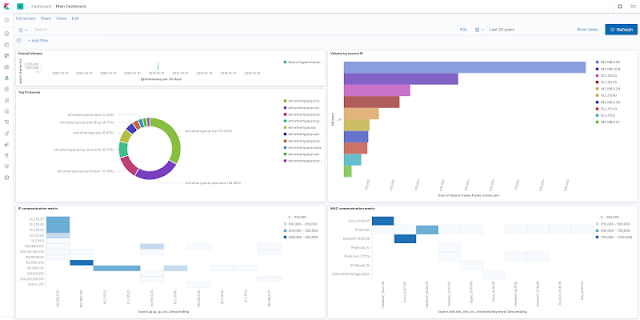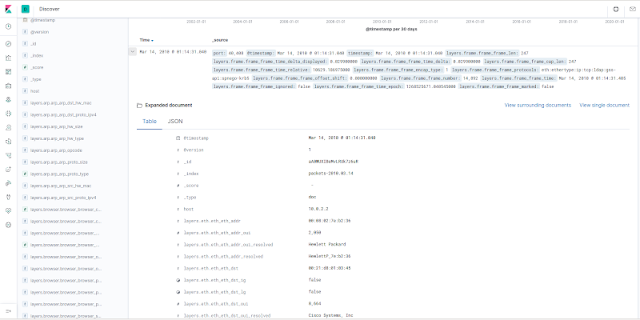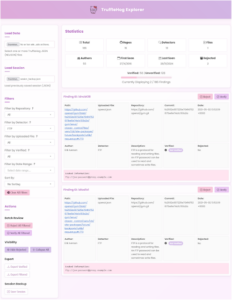tsharkVM – Tshark + ELK Analytics Virtual Machine

This project builds virtual machine which can be used for analytics of tshark -T ek (ndjson) output. The virtual appliance is built using vagrant, which builds Debian 10 with pre-installed and pre-configured ELK stack.
After the VM is up, the process is simple:
- decoded pcaps (
tshark -T ek output/ ndjson) are sent overTCP/17570to the VM - ELK stack in VM will process and index the data
- Kibana is running in VM and can be accessed on
http://127.0.0.1:15601/app/kibana#/dashboards
Instuctions to build VM from Ubuntu desktop
Clone source code
git clone https://github.com/H21lab/tsharkVM.gitBuild tshark VM
sudo apt update
sudo apt install tshark virtualbox vagrant
bash ./build.shUpload pcaps to VM
# copy your pcaps into ./Trace
# run following script
bash upload_pcaps.sh
# or use tshark directly towards 127.0.0.1 17570/tcp
tshark -r trace.pcapng -x -T ek > /dev/tcp/localhost/17570Open Kibana with browser
firefox http://127.0.0.1:15601/app/kibana#/dashboardsOpen Main Dashboard and increase time window to e.g. last 100 years to see there the sample pcaps.


SSH to VM
cd ./VM
vagrant sshDelete VM
cd ./VM
vagrant destroy defaultStart VM
cd ./VM
vagrant upStop VM
cd ./VM
vagrant haltSSH into VM and check if ELK is running correctly
cd ./VM
vagrant ssh
sudo systemctl status kibana.service
sudo systemctl status elasticsearch.service
sudo systemctl status logstash.serviceElasticsearch mapping template
In the project is included simple Elasticseacrh mapping template generated for the frame,eth,ip,udp,tcp,dhcp protocols. To handle additional protocols efficiently it can be required to update the mapping template in the following way:
# 1. Create custom mapping, by selecting required protocols
tshark -G elastic-mapping --elastic-mapping-filter frame,eth,ip,udp,tcp,dns > ./Kibana/custom_tshark_mapping.json
# 2. Deduplicate and post-process the mapping to fit current Elasticsearch version
ruby ./Public/process_tshark_mapping_json.rb
# 3. Upload file to vagrant VM
cd VM
vagrant upload ../Kibana/custom_tshark_mapping_deduplicated.json /home/vagrant/tsharkVM/Kibana/custom_tshark_mapping_deduplicated.json
cd ..
# 4. Connect to VM and upload template in the Elasticsearch
cd VM
vagrant ssh
cd tsharkVM/Kibana
curl -X PUT "localhost:9200/_index_template/packets_template" -H 'Content-Type: application/json' -d@custom_tshark_mapping_deduplicated.json
Alternative can be using the dynamic mapping. See template ./Kibana/template_tshark_mapping_dynamic.json. And consider setting the numeric_detection parameter true/false depending on the mapping requirements and pcaps used. Upload the template into Elasticsearch in similar way as described above.
Limitations
tshark -G elastic-mapping –elastic-mapping-filter mapping could be outdated, it is not following properly the Elasticsearch changes and the output can be duplicated. The manual configuration and post-processing of the mapping template is required.
Program is distributed in the hope that it will be useful, but WITHOUT ANY WARRANTY.
License
The default license of source codes provided inside this project is the Apache License v2.0. Additionally refer to individual licenses and terms of used of installed software (see licenses for Wireshark, Elastic and other).
Attribution
Special thanks to people who helped with the Wireshark development or otherwise contributed to this work:
- Anders Broman
- Alexis La Goutte
- Christoph Wurm
- Dario Lombardo
- Vic Hargrave
Example pcap in ./Traces subfolder was downloaded from https://wiki.wireshark.org/SampleCaptures
Created by Martin Kacer
Copyright 2021 H21 lab, All right reserved, https://www.h21lab.com
If you like the site, please consider joining the telegram channel or supporting us on Patreon using the button below.



